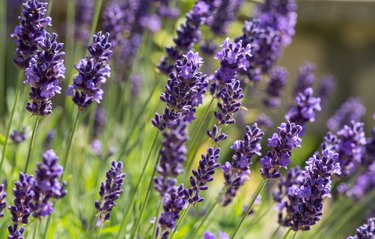
Lavender plants (Lavandula spp.) and lavender essential oil have many benefits, but you may want to think twice when purchasing lavender if you own a cat. Although lavender is excellent for human use, it can unfortunately be very poisonous to cats. Being aware of lavender's toxicity to cats can save your cat and prevent you from getting a large vet bill.
Tip
Lavender is indeed poisonous to cats as well as to dogs and horses.
Video of the Day
Lavender Plant Characteristics
Lavandula angustifolia, commonly called English lavender, is an aromatic shrub that's native to the Mediterranean, Middle East, and India. As a small, semiwoody shrub, English lavender is a perennial in USDA plant hardiness zones 5 through 9, but other lavender species are less cold-hardy and survive winters only in warmer climates. Plants have gray-green leaves and can produce blue-violet, mauve, pink, or white flowers, depending on species and cultivar. Although lavender plants grow best outdoors, you may be able to grow yours successfully indoors with the proper care.
Video of the Day
Lavender Plants and Cats
Although lavender is a beautiful plant to keep in any space, if you have cats, you may want to think twice about keeping this shrubby plant around them. If ingested, lavender is toxic to cats and can cause nausea, vomiting and inappetence. The reason lavender is toxic for cats is because the plant contains linalool and linalyl acetate.
Cats lack the enzymes needed to process linalool and linalyl acetate, so if your cat ingests the plant, it will get sick. Not only are lavender plants unsafe for cats to digest but you also have to be wary of lavender essential oil as well.
Lavender Essential Oil and Cats
Essential oils are concentrated extracts of plants, so you want to be careful when keeping them around your cat. Lavender essential oils contain chemicals that can be absorbed through your cat's skin. If a cat ingests lavender essential oil, it can cause gastrointestinal upset and even liver damage if large amounts are consumed.
If lavender essential oil spills on your cat, it can also irritate or burn your cat's skin and mouth. If ingested, the lavender essential oil can cause vomiting, difficulty breathing, drooling, redness or burns on the lips, gums, tongue or skin.
Treating Lavender Poisoning
If your cat has ingested a lavender plant or lavender essential oil, call your veterinarian or the pet poison helpline immediately. Never induce vomiting on your own because you can make your cat's condition worse. If some lavender essential oil has gotten on your cat's skin or fur, contact your veterinarian or the pet poison helpline to ask if your cat needs to be seen. While waiting for the next steps, wash off the oil with dishwashing liquid.
Protecting Your Cat
The best way to protect your cat is by keeping lavender plants and essential oils out of reach. Cat owners know that cats can be a bit curious, so it's best not to keep lavender plants inside. If you want to use lavender essential oils, your best option is to keep the bottles closed, and if your cat likes to lick you, don't apply lavender oil on your body where it's easily accessible.
You can diffuse lavender essential oil but try to keep your oil diffuser in a secure area. You don't want to place your diffuser in a place where your cat can easily knock it over. Placing the diffuser in an area that your cat doesn't frequent will also ensure that tiny droplets don't land on the cat's fur. If your cat has breathing issues, then avoid diffusing essential oils altogether because the smell will overwhelm your cat.